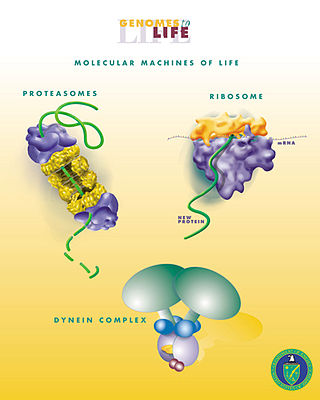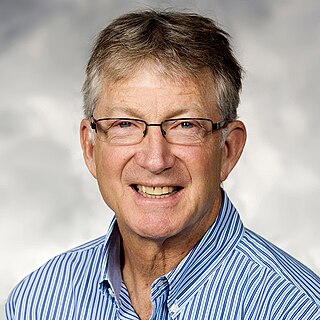
Biochemical engineering, also known as bioprocess engineering, is a field of study with roots stemming from chemical engineering and biological engineering. It mainly deals with the design, construction, and advancement of unit processes that involve biological organisms or organic molecules and has various applications in areas of interest such as biofuels, food, pharmaceuticals, biotechnology, and water treatment processes. The role of a biochemical engineer is to take findings developed by biologists and chemists in a laboratory and translate that to a large-scale manufacturing process.

Armand Paul Alivisatos is an American chemist and academic administrator who has served as the 14th president of the University of Chicago since September 2021. He is a pioneer in nanomaterials development and an authority on the fabrication of nanocrystals and their use in biomedical and renewable energy applications. He was ranked fifth among the world's top 100 chemists for the period 2000–2010 in the list released by Thomson Reuters.

George McClelland Whitesides is an American chemist and professor of chemistry at Harvard University. He is best known for his work in the areas of nuclear magnetic resonance spectroscopy, organometallic chemistry, molecular self-assembly, soft lithography, microfabrication, microfluidics, and nanotechnology. A prolific author and patent holder who has received many awards, he received the highest Hirsch index rating of all living chemists in 2011.

Biological engineering or bioengineering is the application of principles of biology and the tools of engineering to create usable, tangible, economically viable products. Biological engineering employs knowledge and expertise from a number of pure and applied sciences, such as mass and heat transfer, kinetics, biocatalysts, biomechanics, bioinformatics, separation and purification processes, bioreactor design, surface science, fluid mechanics, thermodynamics, and polymer science. It is used in the design of medical devices, diagnostic equipment, biocompatible materials, renewable energy, ecological engineering, agricultural engineering, process engineering and catalysis, and other areas that improve the living standards of societies.
Tobin Jay Marks is an inorganic chemistry Professor, the Vladimir N. Ipatieff Professor of Catalytic Chemistry, Professor of Material Science and Engineering, Professor of Chemical and Biological Engineering, and Professor of Applied Physics at Northwestern University in Evanston, Illinois. Among the themes of his research are synthetic organo-f-element and early-transition metal organometallic chemistry, polymer chemistry, materials chemistry, homogeneous and heterogeneous catalysis, molecule-based photonic materials, superconductivity, metal-organic chemical vapor deposition, and biological aspects of transition metal chemistry.

Chad Alexander Mirkin is an American chemist. He is the George B. Rathmann professor of chemistry, professor of medicine, professor of materials science and engineering, professor of biomedical engineering, and professor of chemical and biological engineering, and director of the International Institute for Nanotechnology and Center for Nanofabrication and Molecular Self-Assembly at Northwestern University.
Seth R. Marder is an American physical chemist best known for his development of the quantum mechanical foundations of nonlinear electro-optics in organic dyes and materials.
William E. Bentley is the Robert E. Fischell Distinguished Professor of Engineering, founding Director of the Fischell Institute for Biomedical Devices, and currently the Director of the Maryland Technology Enterprise Institute in the A. James Clark School of Engineering at the University of Maryland. He was previously the Chair of the Fischell Department of Bioengineering, where he assisted in establishing the department and provided leadership that led to its nationally ranked status.
Kristi S. Anseth is the Tisone Distinguished Professor of Chemical and Biological Engineering, an Associate Professor of Surgery, and a Howard Hughes Medical Investigator at the University of Colorado at Boulder. Her main research interests are the design of synthetic biomaterials using hydrogels, tissue engineering, and regenerative medicine.
Richard B. Kaner is an American synthetic inorganic chemist. He is a distinguished professor and the Dr. Myung Ki Hong Endowed Chair in Materials Innovation at the University of California, Los Angeles, where he holds a joint appointment in the Department of Chemistry and Biochemistry and the Department of Material Science and Engineering. Kaner conducts research on conductive polymers (polyaniline), superhard materials and carbon compounds, such as fullerenes and graphene.

James R. Chelikowsky is a professor of physics, chemical engineering, and chemistry at The University of Texas at Austin. He is the director of the Institute for Computational Engineering and Sciences' Center for Computational Materials. He holds the W.A. "Tex" Moncrief Jr. Chair of Computational Materials.

James C. Liao is the Parsons Foundation Professor and Chair of the Department of Chemical and Biomolecular Engineering at the University of California, Los Angeles and is the co-founder and lead scientific advisor of Easel Biotechnologies, LLC.

Emily Ann Carter is the Gerhard R. Andlinger Professor in Energy and the Environment and a professor of mechanical and aerospace engineering, the Andlinger Center for Energy and the Environment, and the Program in Applied and Computational Mathematics at Princeton University. She has been on the faculty at Princeton since 2004, including as serving as Princeton's Dean of the School of Engineering and Applied Science from 2016 to 2019. She moved to UCLA to serve as executive vice chancellor and provost and a distinguished professor of chemical and biomolecular engineering, before returning to Princeton in December 2021. Carter is a theorist and computational scientist whose work combines quantum mechanics, solid-state physics, and applied mathematics.

The Beckman Institute at Caltech is a multi-disciplinary center for research in the chemical and biological sciences, located at and partnering with the California Institute of Technology (Caltech) in Pasadena, California, United States.

Rigoberto Hernandez is an American chemist and academic. He is The Gompf Family Professor at the Johns Hopkins University and was formerly a board member of the American Chemical Society (ACS). Before his appointment at Johns Hopkins, Hernandez spent 20 years as a faculty member at the Georgia Institute of Technology, where he became a full professor. In addition to his work as a professor, Hernandez is also the director of the Open Chemistry Collaborative in Diversity Equity, a program dedicated to creating more diversity in academia.

James L. Skinner is an American theoretical chemist. He is the Joseph O. and Elizabeth S. Hirschfelder Professor Emeritus at the University Wisconsin-Madison. He is also a member of the Scientific Advisory Board of the Welch Foundation. Most recently, Skinner was the Crown Family Professor of Molecular Engineering, professor of chemistry, director of the Water Research Initiative and deputy dean for faculty affairs of the Pritzker School of Molecular Engineering at the University of Chicago. Skinner is recognized for his contributions to the fields of theoretical chemistry, nonequilibrium statistical mechanics, linear and nonlinear spectroscopy of liquids, amorphous and crystalline solids, surfaces, proteins, and supercritical fluids. Skinner is the co-author of over 230 peer-reviewed research articles.

Thomas H. Epps, III is an American chemist and the Thomas & Kipp Gutshall Professor of Chemical & Biomolecular Engineering at the University of Delaware. He has a joint appointment in Materials Science & Engineering, and an affiliated appointment in Biomedical Engineering. He serves as the director of the Center for Research in Soft Matter & Polymers, the director of the Center for Hybrid, Active, and Responsive Materials, and the co-director of the Center for Plastics Innovations. His research considers the design, synthesis, characterization, and application of nanostructure-containing polymers related to biobased materials, drug delivery, alternative energy (batteries), nanotemplating, and composite-based personal-protective equipment. He is also the co-founder of Lignolix, which is focused on the valorization of biomass waste.
Arthi Jayaraman is an Indian-American scientist who is the Centennial Term Professor for Excellence in Research and Education at the University of Delaware. Her research considers the development of computational models to better understand polymer nanocomposites and biomaterials. Jayaraman was elected Fellow of the American Physical Society in 2020.
Charles Wyatt Shields IV is an American biomedical engineer and assistant professor at the University of Colorado Boulder in the Department of Chemical and Biological Engineering. His research involves the rational design of colloidal and supracolloidal particles for applications in drug delivery and biosensing.
Christopher A. Alabi is an American chemist and associate professor of chemistry at Cornell University. His research considers the design of sustainable materials and biomolecular therapeutics. He was elected to the American Institute for Medical and Biological Engineering in 2023.











